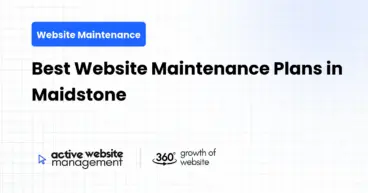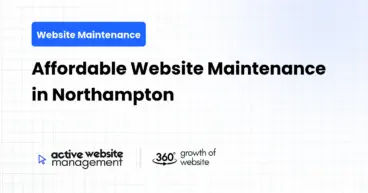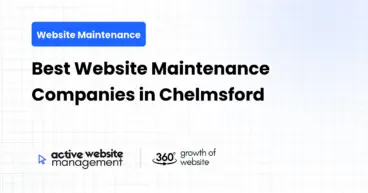January 20, 2025
15 min read
Your real estate website is your digital storefront, your 24/7 salesperson, and a crucial lead-generating machine. Just like a physical property, it needs regular care and attention to stay in top shape and attract potential clients. Neglecting your website is like letting a beautiful house fall into disrepair – it loses its appeal and effectiveness. This article dives into seven proven website maintenance tips specifically tailored for real estate agents, ensuring your online presence is not just present, but powerful. We’ll cover everything from the “why” behind these practices to the “how,” making sure your property website care, realtor site upkeep, and housing platform maintenance are prioritized and executed effectively.
1. Regularly Update Your Content: Keep It Fresh and Relevant
Why is content freshness important? Imagine walking into a grocery store and finding only expired goods. Would you stay? Probably not. The same goes for your website. Stale content signals neglect to both search engines and visitors. They see it and think, “This information is old, maybe the agent isn’t active anymore.” Fresh, updated content, however, tells people you’re engaged, knowledgeable, and on top of your game. This is crucial for effective property website care and overall success.
Why Regular Content Updates Matters:
- SEO Boost: Search engines like Google favor websites that are consistently updated with new and relevant content. This signals to them that your site is active and provides value to users, leading to higher rankings. Keywords such as “local market updates,” “new listings,” and “real estate tips” help attract the right audience.
- User Engagement: Fresh content keeps users engaged and coming back for more. If your blog has regularly updated posts about local market trends, neighborhood spotlights, or home-buying advice, people are more likely to keep checking back.
- Establish Authority: Consistently publishing valuable content positions you as an expert in your market. Sharing insights about the local area, market statistics, and the buying/selling process builds trust with potential clients.
- Reduce Bounce Rates: Old or outdated content can lead to high bounce rates, meaning visitors leave your site quickly. Fresh content encourages visitors to explore further, keeping them on your site longer. This is key in realtor site upkeep.
How to Keep Your Content Fresh:
- Blog Regularly: Aim for at least one blog post per week. Share market updates, neighborhood guides, buyer and seller tips, success stories, and local event information. Use relevant keywords like “buying a home in [your city],” “selling a property in [your area],” or “[neighborhood] real estate market.”
- Update Property Listings: Make sure all your listings are accurate, up-to-date, and include high-quality photos and videos. Remove sold listings promptly.
- Refresh Your About Page: Your “About Me” page is a key opportunity to connect with visitors. Update it regularly with new experiences, certifications, or awards you’ve achieved.
- Add Testimonials: Collect and publish recent client testimonials. Positive feedback adds credibility and can persuade potential clients to choose you.
- Review and Revise Old Content: Don’t just keep adding new content, revisit old content and revise it for accuracy and freshness. This is a vital part of thorough housing platform maintenance.
A slow website is a killer. In today’s fast-paced digital world, users expect websites to load quickly. If your site takes too long, they’ll likely leave and go to a competitor. Optimizing for speed and performance is a non-negotiable part of effective property website care. It’s about making sure potential clients have a smooth and enjoyable experience on your website, leading to more leads and ultimately, more sales.
Why Website Speed Matters:
- User Experience: Slow websites frustrate users and negatively impact their perception of your business. Speed is directly related to user satisfaction.
- SEO Rankings: Google considers website speed as a ranking factor. Faster websites are more likely to rank higher in search results.
- Conversion Rates: Slow websites can lead to high bounce rates and lost leads. A fast site ensures visitors stay engaged, increasing your chances of converting them into clients.
- Mobile-First Indexing: With mobile devices being the primary way people browse the internet, having a fast and responsive mobile site is crucial. Google prioritizes mobile-friendly sites in its search results.
How to Optimize Your Website Speed:
- Optimize Images: Compress images to reduce their file size without compromising quality. Use appropriate file formats like JPEG for photos and PNG for graphics. Tools like TinyPNG or ImageOptim can help.
- Use a Content Delivery Network (CDN): A CDN stores your website’s files on servers across the globe, so users access content from the server closest to them, reducing load times.
- Minimize HTTP Requests: Reduce the number of requests your browser makes to the server by combining CSS and JavaScript files, and removing unnecessary elements.
- Enable Browser Caching: Enable browser caching so returning visitors load your site faster.
- Choose a Reliable Hosting Provider: Your hosting provider plays a big role in website speed. Select a host that offers fast servers and reliable uptime.
- Minify CSS, JavaScript, and HTML: Remove unnecessary characters from code to make files smaller and quicker to load.
- Test Your Website Speed Regularly: Use tools like Google PageSpeed Insights, GTmetrix, and WebPageTest to assess your site’s speed and performance, and identify areas for improvement. This should be a recurring element of your realtor site upkeep.
3. Ensure Mobile Responsiveness: Reach Every Potential Client
In the age of smartphones and tablets, having a mobile-responsive website is no longer a luxury; it’s an absolute necessity. A mobile-responsive website adapts its layout and design to fit any screen size, ensuring a seamless user experience for all visitors. Without it, you risk alienating a large portion of your audience who are increasingly using their mobile devices to search for homes. This is a critical component of modern housing platform maintenance.
Why Mobile Responsiveness is Essential:
- Mobile-First Indexing: Google primarily uses the mobile version of your website for indexing and ranking, meaning a non-mobile-friendly site will suffer in search results.
- User Convenience: Mobile users often browse the internet on the go, so they need a website that is easy to navigate on a smaller screen.
- Increased Traffic: A significant portion of your potential clients will access your website from their mobile phones. A non-responsive website will discourage them and they’ll move on to a competitor’s site.
- Improved Conversion Rates: A well-designed mobile site provides a seamless user experience, increasing the chances of visitors becoming clients.
- Professional Image: A website that looks and functions well on all devices creates a professional and trustworthy impression.
How to Ensure Mobile Responsiveness:
- Use a Responsive Theme: If you’re using a website builder like WordPress, choose a responsive theme that is designed to adapt to different screen sizes.
- Test on Multiple Devices: Regularly test your website on various mobile phones and tablets to ensure it looks and functions correctly.
- Implement a Flexible Grid System: A flexible grid system ensures that your content and elements are arranged correctly on different screen sizes.
- Optimize Images for Mobile: Compress and resize images to ensure they load quickly on mobile devices.
- Keep Navigation Simple: Mobile navigation should be clear and easy to use, with touch-friendly buttons and menus.
- Use Scalable Fonts: Use fonts that are easy to read on all screen sizes, and use relative units (like percentages) instead of fixed units (like pixels) for font sizes.
- Avoid Flash Content: Flash content doesn’t work on many mobile devices, so avoid it.
Don’t Just Maintain Your Website—
Grow It using Active Website Management! Don't Wait for Growth—Accelerate It with Active Website Management
4. Back Up Your Website Regularly: Protect Your Investment
Imagine losing all your website data – your listings, blog posts, client testimonials, everything! It’s a digital nightmare that can cripple your business. Regularly backing up your website is essential for protecting your investment and ensuring business continuity. It’s a crucial practice of comprehensive property website care that allows you to quickly recover from any unexpected issues.
Why Regular Website Backups are Necessary:
- Data Loss Prevention: Website data can be lost due to hacking attempts, server crashes, software errors, or accidental deletions. Backups ensure you can restore your website to its previous state.
- Protection Against Security Breaches: If your site is hacked, you can quickly restore it from a clean backup rather than rebuilding it from scratch.
- Peace of Mind: Knowing that you have a recent backup provides peace of mind and reduces the stress of potential data loss.
- Quick Recovery: Backups allow you to quickly restore your website in case of any issues, minimizing downtime and the impact on your business.
How to Back Up Your Website:
- Manual Backups: You can manually back up your website files and database using your hosting control panel. This is a good option for smaller sites with less frequent changes.
- Automated Backups: Set up automated backups through your hosting provider or a third-party service. This ensures your website is backed up regularly without any manual effort.
- Cloud Backups: Backing up your site to a cloud service like Google Drive, Dropbox, or Amazon S3 provides an additional layer of security and redundancy.
- Keep Multiple Backups: Don’t just rely on one backup. Keep multiple backups from different time periods so you can revert to an earlier version if necessary.
- Test Your Backups Regularly: Make sure you can successfully restore your website from your backups. Don’t wait until disaster strikes to find out your backup process isn’t working. This is a fundamental task for realtor site upkeep.
5. Implement Security Measures: Protect Your Website and Visitors
Website security is not an option; it’s a necessity. Cyber threats are constantly evolving, and if your site isn’t properly secured, it could be hacked, infected with malware, or used for malicious purposes. This is a vital part of diligent housing platform maintenance that protects your business, your clients, and your reputation.
Why Website Security is Crucial:
- Protect Your Data: Website security protects your sensitive data, such as client information, listings, and personal details.
- Prevent Hacking: A secure website is less vulnerable to hacking attempts and malware infections.
- Maintain Your Reputation: A hacked or compromised website can damage your reputation and erode trust with your potential clients.
- Protect Your Visitors: A secure website protects your visitors from malicious software and phishing attacks.
- SEO Benefits: Search engines often penalize hacked or insecure websites, leading to lower rankings.
How to Implement Security Measures:
- Install an SSL Certificate: An SSL certificate encrypts the data transmitted between your website and your visitors’ browsers, protecting sensitive information.
- Use Strong Passwords: Choose strong, unique passwords for your website and hosting accounts. Use a password manager to generate and store complex passwords.
- Keep Software Updated: Regularly update your website software, including your CMS, plugins, and themes. Outdated software is more vulnerable to security threats.
- Use a Security Plugin: Implement a security plugin on your website that monitors for suspicious activity, blocks malicious IP addresses, and scans for malware.
- Enable Two-Factor Authentication (2FA): Enable 2FA to add an extra layer of security to your login process.
- Regularly Scan for Vulnerabilities: Use vulnerability scanners to identify potential security weaknesses on your website.
- Choose a Secure Hosting Provider: Select a hosting provider that offers secure servers and reliable security measures.
- Educate Your Staff: Train your staff on basic security practices to prevent accidental security breaches.
You can’t improve what you don’t measure. Website analytics provide invaluable insights into how your visitors use your website, allowing you to make informed decisions that improve your website’s performance and user experience. Regularly analyzing your website data is a critical part of property website care that guides your online strategy.
Why Analyzing Website Analytics is Important:
- Understand Your Audience: Website analytics reveal valuable information about your audience, such as demographics, interests, and behavior.
- Identify Popular Content: Analytics can show which pages and content on your site are most popular, allowing you to create more of what your audience loves.
- Improve User Experience: By analyzing how users navigate your site, you can identify areas that need improvement.
- Track Conversions: Analytics can track how many visitors are turning into leads, allowing you to optimize your website for more conversions.
- Measure ROI: Track how your online marketing campaigns are performing to ensure you’re getting the best return on your investment.
- Identify and Fix Problems: Analytics can highlight problems on your site, such as broken links or high bounce rates, enabling you to fix them promptly.
How to Analyze Website Analytics:
- Set Up Google Analytics: Google Analytics is a free tool that provides detailed data about your website traffic. Set it up on your website and learn how to use it.
- Monitor Key Metrics: Pay attention to key metrics such as traffic, bounce rate, time on site, page views, conversion rate, and traffic sources.
- Identify Trends: Look for trends in your data to understand what is working and what isn’t.
- Segment Your Data: Segment your data by factors like device, location, and traffic source to understand your audience better.
- Use Heatmaps: Heatmaps can visually show where visitors are clicking on your site, revealing areas of interest and usability issues.
- Set Up Goals: Set up goals in Google Analytics to track specific actions you want visitors to take, such as filling out a contact form or downloading a brochure.
- Regularly Review Your Analytics: Review your website analytics regularly, at least once a month, and adjust your strategy based on what you learn. This is a routine part of good realtor site upkeep.
7. Active Website Management: The Key to Long-Term Success
All of these tips contribute to a well-maintained website, but truly thriving online requires active management. This involves not just implementing these practices, but consistently reviewing, adapting, and optimizing your website for maximum effectiveness. For real estate agents who want to maintain a powerful online presence, active website management is the best path to lasting success.
Active Website Management, like what is offered at Active Website Management, provides a comprehensive solution to keep your site performing at its best. This service offers a proactive approach to website maintenance, moving beyond reactive fixes to ongoing optimization.
Why Active Website Management is Crucial:
- Proactive Maintenance: Instead of waiting for issues to arise, active management involves continuously monitoring and maintaining your website.
- Ongoing Optimization: Active management focuses on continuously improving your website’s performance and user experience.
- Expert Assistance: With a dedicated team of experts, you can focus on growing your business while your website is in good hands.
- Time Savings: Outsourcing your website maintenance frees up your time to focus on other important aspects of your business.
- Peace of Mind: Knowing that your website is being actively managed provides peace of mind and reduces the stress of potential website issues.
- Improved Results: Active management leads to improved website performance, user engagement, and ultimately, better business results.
- Consistency: A managed solution ensures consistency in the care and upkeep of your website, preventing stagnation and missed opportunities.
What Active Website Management Typically Includes:
- Regular Website Backups: Frequent backups ensure your website is safe and easily recoverable.
- Security Monitoring and Updates: Proactive monitoring of security threats, and timely updates to prevent vulnerabilities.
- Content Updates and Management: Content is kept fresh and relevant to ensure visitors have the most up to date information.
- Website Speed and Performance Optimization: Continual efforts to ensure fast load times and a smooth user experience.
- SEO Monitoring and Optimization: Keeping your site optimized for search engines, improving your online visibility.
- Website Analytics Analysis: Regular analysis of site performance to guide improvement and strategic planning.
- Technical Support: A support team that is available to address any issues or concerns that may arise.
Choosing Active Website Management:
When choosing an active website management service, consider:
- Your Specific Needs: Ensure the service meets your unique business and website requirements.
- Level of Support: Determine the amount of support you will need.
- Experience of the Team: Choose a provider with a track record of success and expertise.
- Cost: Find a service that is within your budget, but don’t sacrifice quality for price.
- Communication and Transparency: Make sure the provider has clear communication and keeps you informed of all actions taken.
Investing in active website management is an investment in your online success. By proactively managing your website, you can create a powerful online presence that attracts leads, engages clients, and helps you achieve your business goals. Remember, consistent and diligent housing platform maintenance is key to your long-term online success.
By following these seven proven tips, you’ll be well on your way to maintaining a high-performing real estate website that attracts clients, generates leads, and contributes to the overall growth of your business. Remember that proactive property website care and consistent realtor site upkeep are essential to creating a powerful online presence, and that active housing platform maintenance will ensure you stay ahead of the competition.







